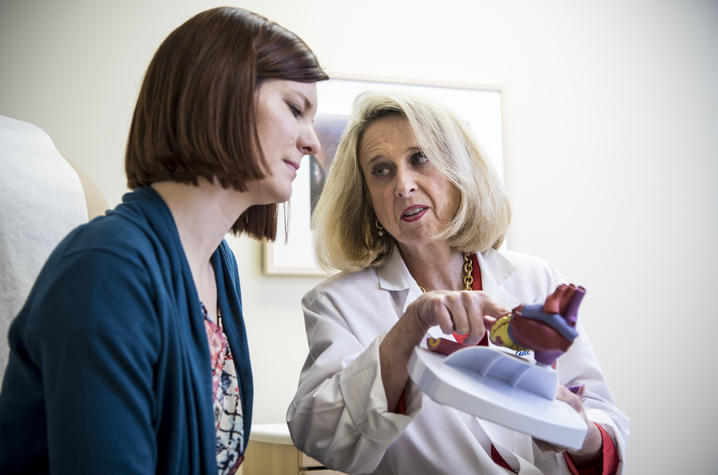Guard Your Heart: Why Women Should Be More Proactive with Heart Health
LEXINGTON, Ky. (Feb. 5, 2021) – You may see a lot of people wearing red today. It is not a coincidence.
The first Friday of February is nationally recognized as “Wear Red Day,” a spirit day of sorts, to raise awareness about women’s heart health. For Dr. Gretchen Wells, director of the Women’s Heart Program at the UK HealthCare Gill Heart & Vascular Institute, the day goes beyond sporting a red shirt or dress.
“More women die of heart disease than all cancers combined,” Wells said. “Most people are usually shocked when I tell them that, but it is true. Heart disease is the number one killer of women.”
The statistics are startling, especially in Kentucky. The state ranks as one of the highest in the country for incidence of heart disease and, according to recent data, the number is expected to rise. “Most women are up to date about their cancer screenings – mammograms, pap smears – but it is vitally important to remember that you need to keep up with heart screenings, too,” Wells said.
Heart disease is preventable. Wells hopes that with increased education, appropriate screenings and lifestyle changes, we can turn these numbers around. “This needs to be on every woman’s radar – young and old,” she said. “Young and middle-age women are dying from heart disease.”
There are several risk factors, including obesity, smoking and diabetes. Pregnant women can also be at-risk. Complicated pregnancies, pre-eclampsia and gestational diabetes are risk factors for heart disease later in life, which can start as early as a few years after pregnancy.
Wells recommends simple, routine check-ups with your family doctor to keep up with your health – even a nurse visit will suffice. Does heart disease run in your family? You should disclose that information to your doctor. Track your blood pressure, know if you are diabetic or pre-diabetic, and have a handle on your cholesterol and low-density lipoprotein (LDL) numbers. High LDL levels lead to a buildup of cholesterol in your arteries.
“Just like we know our shoe and bra size, you need to know what your cholesterol numbers are,” Wells said. “Being armed with this knowledge can reduce your risk of heart disease and help you to live a long, healthy life.”
Changing your lifestyle can help. If you smoke, there are resources available to help you quit. It is important to keep an eye on your diet. Wells recommends adding fresh, seasonal fruit and vegetables to your meals and snacks. If you like meat, fatty fish like salmon is a healthy choice, and drinking plenty of water throughout the day is vital.
“Additionally, exercise works wonders, and it is important to remember that small steps can have a huge impact,” Wells said. “The Nurses’ Health Study found that women who exercise 30 minutes, five days a week, reduced their risk of a heart attack by 50 percent. That outperforms most prescriptions that I can write for you.” Exercise can be something as simple as a brisk walk – anything to keep your body moving.
Overall, Wells said hospitals have seen a decline in the number of people seeking treatment for heart conditions, likely due to a fear of catching the COVID-19 virus. She recommends keeping your appointments and be mindful of any symptoms you may experience that could indicate heart trouble. Symptoms vary between men and women, as women will present with chest pressure or tightness, not necessarily pain, and you may feel like your shirt is too tight. Other signs include nausea, extreme fatigue, jaw and shoulder pain. If you feel anything out of the ordinary, Wells recommends getting it checked out.
“Today is not about a red dress or shirt. It is about taking ownership and responsibility for your health,” she said. “We need to empower our patients to do everything they can to minimize the risk and complications of heart disease.”
As the state’s flagship, land-grant institution, the University of Kentucky exists to advance the Commonwealth. We do that by preparing the next generation of leaders — placing students at the heart of everything we do — and transforming the lives of Kentuckians through education, research and creative work, service and health care. We pride ourselves on being a catalyst for breakthroughs and a force for healing, a place where ingenuity unfolds. It's all made possible by our people — visionaries, disruptors and pioneers — who make up 200 academic programs, a $476.5 million research and development enterprise and a world-class medical center, all on one campus.






